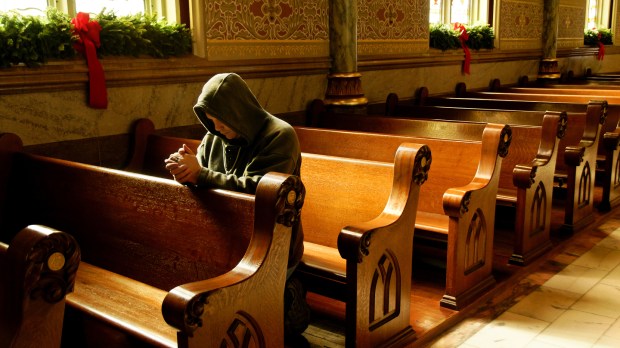This petition in the Our Father comes in two halves making a whole. The first half deals with us, “Forgive us our trespasses.” The second half deals with our dealing with others, “as we forgive those who trespass against us.” Not unreasonably, I’ll dig into first half first.
Here we ask, forgive us our trespasses, and here is a language problem. Catholics use the word “trespasses,” as do many Protestant denominations. Some Protestants, largely Reformed, use “debts.”
Trouble is both are legal phrases and they do not capture the sense of what we are asking. “Trespass” is going beyond one’s rights, like deliberately jumping a fence marking posted land and getting caught where you shouldn’t be. “Debt” isn’t any better. You’ve squandered your credit and now, sorry, it’s bankruptcy court for you.
“Sins” is the rendering in contemporary English and there’s no mistaking what that word means.
At its Hebrew root “sin” means “to miss the mark.” You were aiming carefully at the target, taking your best shot and, stupidly, somehow you missed. “All have sinned and fall short of the glory of God,” as St. Paul has it. (Rm. 3:23) If we were talking about baseball, falling short is your best pitch flopping down 12 feet from the batter’s box, and there it sits, mocking your abilities and everybody can see it.
Seeking forgiveness here means confessing sin “to God Almighty, before the whole company of heaven, and to you, my brothers and sisters.” As if you needed anymore gawkers, huh?
If the language were not so formally ritualized, it would be a downright red-faced embarrassment. But that is the nature of ruptured relationships; that is the fracture of sin. So sin is relational.
Unlike the legalities of debt or trespass, sin fundamentally indicates a betrayal of trust. The relationships that get betrayed are entangled but almost always they involve people we know best and should love most. A harsh word, a mistaken intent, a belittling, an estate squabble, things can boil over.
This is where sin cuts deepest: you with God, you with neighbor and God. But perhaps more devastating than any other, we may also talk about a betrayal of one’s self, that time when fear or shame or anger or all three drove you to abandon your principles.
To ask forgiveness, then, is to seek relief from guilt. There’s another thing. Living with guilt, pop therapists tell us, will unfavorably impact one’s sense of self, and we wouldn’t want that, now would we? We don’t like guilt any more than we like admitting the sin that produced it.
We could skip both, you know. People do. Everybody knows that guilt lowers self-esteem. Really, don’t you need therapy more than forgiveness, therapy to overcome low self-esteem caused from guilt? Then you can get on with the business of living a guilt-free life. No guilt = no sin. See, all fixed.
If you are in that situation (and honest, who isn’t), denying the reality of sin and guilt, try this. Tune in any country “somebody-done-somebody-wrong-song.” There, if you’re running low, you’ll find ample helpings of both for most of the year. If we had ways of turning all that anguish and angst into an energy source, we’d be done with fossil fuels by next weekend.
So sin is real, and so is guilt, but life in Christ is more than either.
There is a higher reality. The resurrection of Christ reveals to our eyes a new world within and around us. We begin to look at ourselves ― our sin and our guilt ― in the light of the risen Christ.
An ancient prophetic promise stirs to life and we get a look at our new reality: “I will forgive their iniquity, and their sin I will remember no more.” (Jer. 31:34b) The Eucharistic remembrance (anamnesis) of Christ’s sacrifice for our sin becomes God’s forgetfulness (amnesia).
Because Christ is raised, whatever the sin, however deep the guilt, we are embraced and from within that embrace Christ once more launches us as a New Creation. We turn once more and ever again to the life God desires for us. For an old fashioned word like sin, there’s nothing more refreshing than an old fashioned word like forgiveness.
PREVIOUSLY: Give us our daily bread; joy amid creation’s devastation
Next: As we forgive those who sin against us

